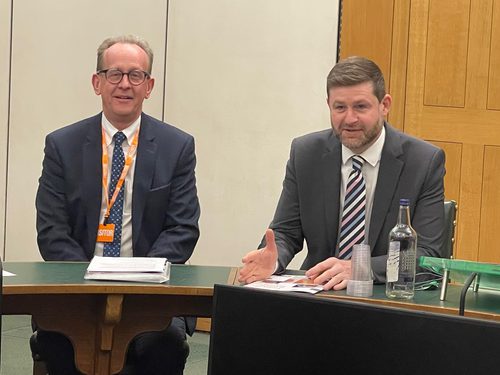
SIGOMA launch fair funding review report in Parliament
Posted on March 19, 2025
On March 18, SIGOMA launched "Towards a Fairer Future" in Parliament alongside MPs and Ministers.
This documents sets out what has gone wrong with the local government finance system and how it can be fixed.
The local government finance system is not fit for purpose. The most deprived councils have seen the biggest cuts and disproportioned increases in demand. There is a significant and growing gap between the outcomes of the most and least deprived communities.
The funding review launched by the government is long-overdue and presents a huge opportunity.
The document welcomes the steps that have been taken so far by the government especially the Recovery Grant, which was an important first step in repairing the relationship between need and funding levels that broke down during austerity.
There are 4 further key asks that can deliver a fair funding system that will allow councils in the most deprived areas to invest in their communities while supporting the government missions. These are:
- Commit to deprivation as a key factor in the formula review
- Commit to regular resets to ensure need is prioritised
- Limit transitional arrangements 3-year period
- Commit to full equalisation of Council Tax receipts
These changes will deliver a significant uplift in funding for the most deprived areas and should be delivered along side more more sustainable investment into the sector.
Press Coverage
The event was covered by a number of articles including:
SIGOMA – the Special Interest Group of Municipal Authorities – represents 49 urban authorities in the northern, midland and south-coast regions of England, and has a longstanding relationship with McMahon, MP for Oldham West, Chadderton and Royton, who said at the launch event in Westminster that the organisation was “as close to a technical college as you can get” in terms of local government education.
Speaking to Room151, Houghton says McMahon’s engagement both at the event and more generally with the sector showed that the government was listening, and “understands the problems that we face – and that’s the first time that has happened in 15 years”. Both Houghton and McMahon highlighted the importance of the Recovery Grant, which the latter said was “building a bridge to multi-year settlements and giving councils the ability to keep their head above water”.
But while all this represents a “real step forward”, SIGOMA and wider local government shouldn’t get “over-confident” and must “keep lobbying, keep making the case” for funding reform, Houghton says.
SIGOMA’s Towards A Fairer Future report does just that, setting out proposals for how government can address the short-, medium- and long-term challenges facing local government leading up to an expected multi-year settlement later this year.
One of those proposals is for the government to commit to deprivation as a key factor in the formula review – something which seems more likely to happen now given that the Recovery Grant is based on deprivation indices.
Houghton, who is also leader of Barnsley Council, tells Room151 that the shift is welcome after “the previous government did not see deprivation as an issue”. He adds: “We had certain ministers and others say ‘people are just people’. Well, clearly that’s not the case. People find themselves in very different circumstances and need very different levels of help and support. So, deprivation is as good an indicator of that as there could be.”
‘Whatever money is in the system it needs to be distributed on the basis of need. That's the bottom line. If it isn't then the poorest and the people who need our help the most will simply continue to miss out. The good news is the Government has said they are willing to listen to these arguments.'
Speaking at the launch of SIGOMA's report, local government minister Jim McMahon said Metropolitan councils were dealing with a ‘perfect storm' of their ‘inherited historical low tax basis'. He added that this was ‘coupled with austerity taking away the core grant and levels of deprivation and demand for services that massively outstripped the available resource to the point they were unsustainable'.
He concluded: ‘In the end, even if we rewrite the funding formula, if we don't deal with that growing demand in adult and children's social care and in temporary accommodation there will not be enough money in the system to sustain councils. That's the grim reality of where we're up to.'
Sir Stephen, who is also the leader of Barnsley MBC, said that the council tax base need to be "regularly updated so they are a realistic assessment of where councils are... but the current system is over 10 years' out of date".
He explained that this outdated total "means people from poorer areas are subsidising council tax bills" to those with less deprivation because the distribution is not "fully cognisant of the council tax base and what it brings into an area".
He said: "It cannot be sustainable. People are being asked to meet their own needs where that's possible and that system has to change. Grants that should have gone to areas at high levels of need and demand have gone to more prosperous areas."
The report highlighted how Band D council tax levels were higher in the most deprived councils than in the least deprived and noted rates were particularly low in some London boroughs.
Last updated: 0019-March-2025
File size: 3.838 MB